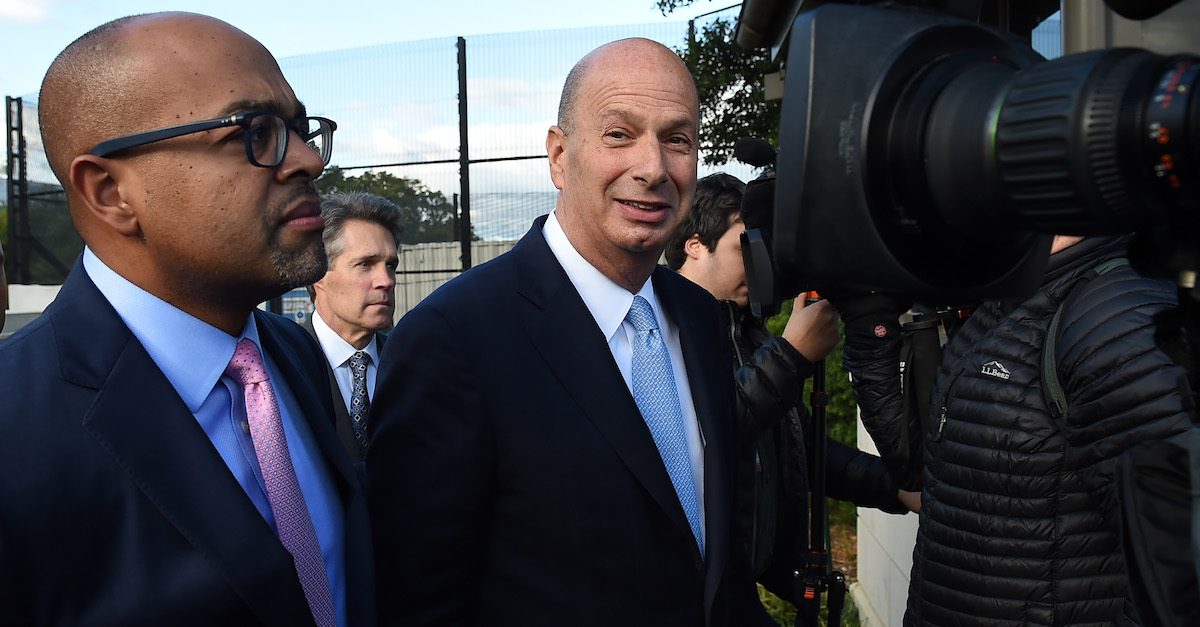
U.S. Ambassador to the European Union Gordon Sondland is testifying on Capitol Hill but not producing key documents. We have our first look at Sondland’s prepared remarks about the ongoing Ukraine scandal. He made it clear that President Donald Trump’s personal attorney Rudy Giuliani was the central figure when it came to influencing Trump on Ukraine policy.
As early as May 23 — “three days after the [Volodymyr] Zelensky inauguration” — Sondland said he and other delegates debriefed Trump and emphasized the “strategic importance of Ukraine and the strengthening relationship with President Zelensky, a reformer who received a strong mandate from the Ukrainian people to fight corruption and pursue greater economic prosperity.”
But Sondland said that President Trump was “skeptical that Ukraine was serious about reforms and anti-corruption, and he directed those of us present at the meeting to talk to Mr. Giuliani, his personal attorney, about his concerns.” Sondland said that it quickly became “apparent to all of us that the key to changing the President’s mind on Ukraine was Mr. Giuliani.” After that, Energy Secretary Rick Perry and now-former U.S. Special Envoy Kurt Volker did what Trump asked, and contacted Giuliani.
Sondland said that he and the others were “disappointed” Trump directed them to get Giuliani involved:
Indeed, Secretary Perry, Ambassador Volker, and I were disappointed by our May 23, 2019 White House debriefing. We strongly believed that a call and White House meeting between Presidents Trump and Zelensky was important and that these should be scheduled promptly and without any pre-conditions. We were also disappointed by the President’s direction that we involve Mr. Giuliani. Our view was that the men and women of the State Department, not the President’s personal lawyer, should take responsibility for all aspects of U.S. foreign policy towards Ukraine
Sondland said that, in their view, there were only two roads to take: scrap attempts to strengthen U.S.-Ukrainian relations or get Giuliani involved. They got Giuliani involved:
However, based on the President’s direction, we were faced with a choice: We could abandon the goal of a White House meeting for President Zelensky, which we all believed was crucial to strengthening U.S.-Ukrainian ties and furthering long-held U.S. foreign policy goals in the region; or we could do as President Trump directed and talk to Mr. Giuliani to address the President’s concerns.
This was around two months before the July 25 Trump-Zelensky call that a whistleblower claimed was a solicitation of foreign interference in the 2020 election, given that the president asked the president of Ukraine to dig up dirt on Democratic presidential candidate Joe Biden and his son Hunter Biden (related to alleged but unsubstantiated corruption).
Sondland claimed that he “did not understand, until much later, that Mr. Giuliani’s agenda might have also included an effort to prompt the Ukrainians to investigate Vice President Biden or his son or to involve Ukrainians, directly or indirectly, in the President’s 2020 reelection campaign.” He also addressed the Trump Administration’s withholding of military aid to Ukraine, aid that Congress had appropriated.
You may remember that U.S. Ambassador William “Bill” Taylor spoke with Sondland by phone on Sept. 1. “Are we now saying that security assistance and WH meeting are conditioned on investigations?” Taylor, who is now scheduled to testify, asked. More than 30 minutes later, Sondland replied: “Call me.”
Then, on September 8, Taylor described a worst-case scenario where Ukrainian officials meet with U.S. officials and still don’t receive aid. Taylor told Sondland and Volker: “The nightmare is they give the interview and don’t get the security assistance. The Russians love it. (And I quit.)”
The next day, on September 9, Taylor and Sondland were seemingly still unclear about how to get their story straight.
Taylor told Sondland: “The message to the Ukrainians (and Russians) we send with the decision on security assistance is key. With the hold, we have already shaken their faith in us. Thus my nightmare scenario.” A follow-up message upped the ante: “Counting on you to be right about this interview, Gordon.”
Sondland appeared personally affronted and replied: “Bill, I never said I was ‘right’. I said we are where we are and believe we have identified the best pathway forward. Let’s hope it works.”
Taylor responded–apparently referencing his September 1 phone call with Sondland: “As I said on the phone, I think it’s crazy to withhold security assistance for help with a political campaign.” Sondland didn’t respond back until hours later — after he had first spoken with Trump. Sondland said that Trump told him there were no “quid pro quo’s of any kind”:
Bill, I believe you are incorrect about President Trump’s intentions. The President has been crystal clear no quid pro quo’s of any kind. The President is trying to evaluate whether Ukraine is truly going to adopt the transparency and reforms that President Zelensky promised during his campaign I suggest we stop the back and forth by text If you still have concerns I recommend you give Lisa Kenna or S a call to discuss them directly. Thanks.
On Thursday, Sondland was prepared to say “clearly,” however, that “Inviting a foreign government to undertake investigations for the purpose of influencing an upcoming U.S. election would be wrong” and “Withholding foreign aid in order to pressure a foreign government to take such steps would be wrong.” Note the use of the words “would be.”
“I did not and would not ever participate in such undertakings,” he added. “In my opinion, security aid to Ukraine was in our vital national interest and should not have been delayed for any reason.”
You can read the rest of Sondland’s planned remarks below.
Gordon Sondland’s Opening Statement by Law&Crime on Scribd
Colin Kalmbacher contributed to this report.
[Image via Olivier Douliery/AFP via Getty Images]